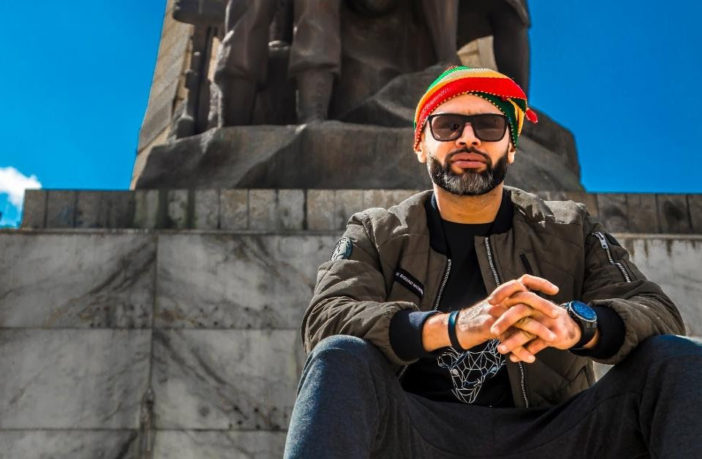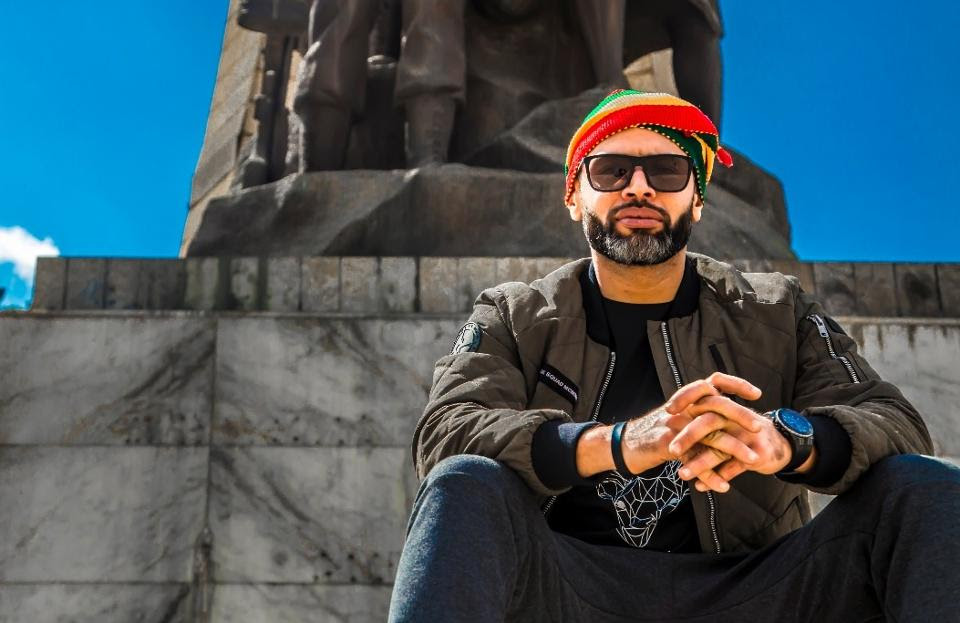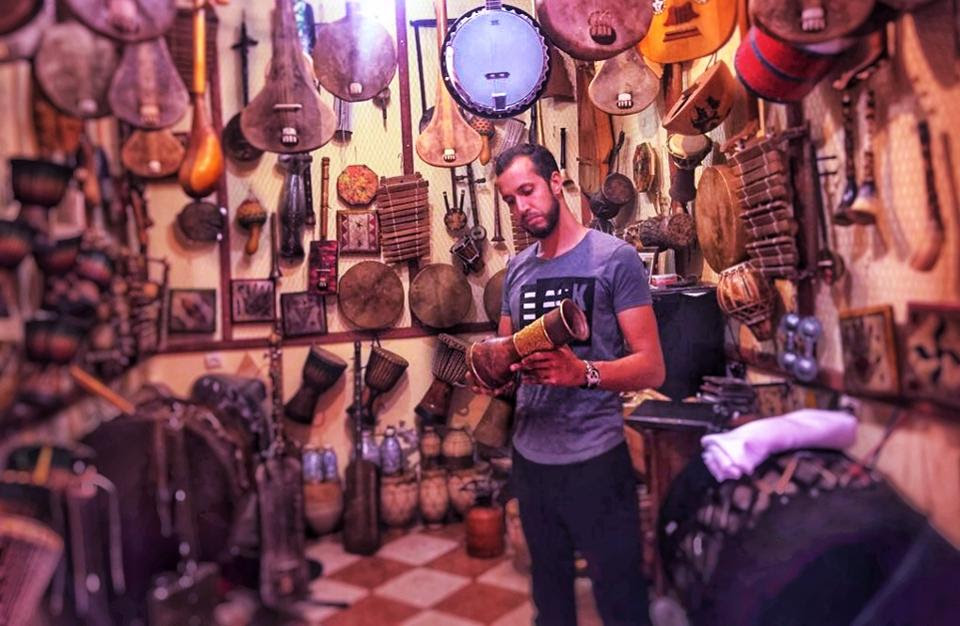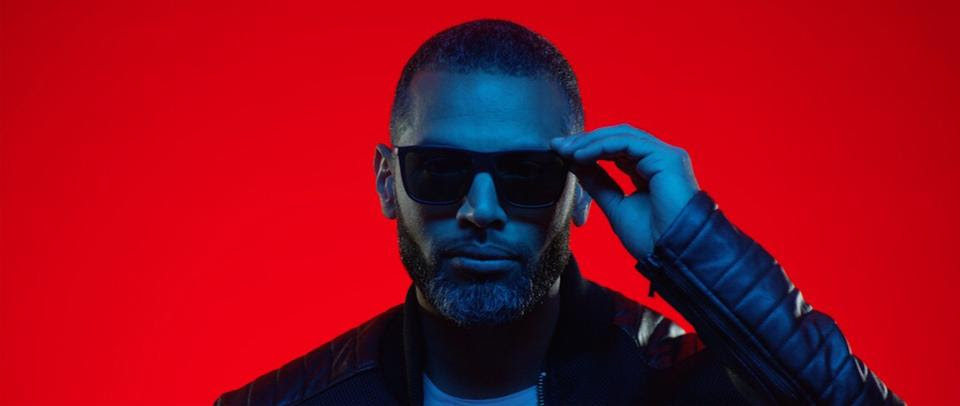Forbes
Alison Lake
Van, an award-winning Moroccan producer, composer and DJ, has been working since 2000 to develop his own compositions while launching career-defining hits for major Moroccan singers and rappers.
This musician, born Khalil Belkas, pushes boundaries of sound and culture. His work is flavored by the diverse musical heritage of his country, along with African and American influences from his youth and today.
I interviewed Van to learn how these elements have inspired both his own compositions and his partnerships with other artists.
Please share about your background: where you grew up in Morocco, what your training was, how you got into the music business. I see you started as a DJ in high school.
I am from Marrakech, the famous red city. I grew up in the alleys of the old medina. I am very lucky to have had the opportunity—it has influenced my music. The old medina lives to the rhythms of folklore troupes, the sounds of traditional craftsmen making their goods, and of course the influence of my family.
With my grandmother, I discovered Houara music, which originated with the Berber tribes of Taroudant, Morocco and influenced music in Marrakech. My father also introduced me to Afro-American culture, jazz and the blues.
Back in the 1990s in my teens, I was a fan of hip hop, rap and American culture, and still am today.
I started out in the music business as a DJ. I started not on turntables, but on tape players! I did a lot of parties with friends and mix tapes, and people liked it and talked about it.
But there was no promotion or Internet back in the time. Some nightclubs contacted me to come mix, and my DJ career was launched.
What have been your musical and cultural inspirations over the years?
Ethnic music in general. I listen to a lot of African music, Afro beat, funk, disco, as well as Moroccan folklore. I follow Afro-American culture and of course urban music. I am the kind of musician who listens to all styles, and every time I get some inspiration from it.
Let’s focus on your own compositions. What instruments and technology do you use? What is your process of composition?
I play percussion and you will find a lot of it in my compositions. I play the drum, especially the tarija [a small handheld drum covered in animal skin]. This Moroccan percussion instrument is very present in our music. People of Morocco like “the groove,” like all Africans. I think the majority of us know how to play the tarija!
Growing up in Marrakech, we learned to play this instrument, which is the main one in the music of ”dekka Marrakchia,” or Moroccan folk music from Marrakech. It’s present at most festivities.
On the technological side, I work with keyboards, laptop, software and plugins to produce and arrange my musical compositions.
I don’t have a specific process of composition. Sometimes I just follow my ideas or blend different inspirations such as hip-hop underground, like I did with my collaboration with music group Fnaïre, for example, when we created what we called “taklidi rap” or traditional rap.
This blended elements of traditional Moroccan music, like American producers and beatmakers did with hip hop—sampling from jazz and the blues.
For me, our blues is gnawa [Sufi with African rhythms] and Hassani music [western Saharan, also known as Sahraoui]. Our funk is Abidat Rama [popular Moroccan folk music] and our soul is malhoun [urban sung poetry in the Andalusian tradition]. I draw on the same techniques when working with Moroccan music.
Please comment on your unique solo style and variety of compositions over the years.
I think that my passion for music and research play a big role in it. Whenever I am in the studio producing for me or another artist, I always set myself a goal to create something new and unique that changes what I have already done.
I am always looking for something new. Of course sometimes, for example, I am inspired by Moroccan folklore, but I am looking for ways to shape it in a whole new way—rearranging, warping and molding everything together into a new sound.
I consider myself a free electron. I don’t like to limit myself to a specific style, and I vary my compositions, styles and collaborations.
Throughout my career, I have challenged myself to experiment new artistic horizons and get out of my comfort zone.
Explain your artistic process for choosing which styles and music genres to compose and produce.
My passion for music, for sounds, coupled with curiosity and a thirst for learning, led me to sequencers and groove boxes.
I was always into making beats. Ever since I was young, I always wondered what goes on behind the scenes and how a song is actually created.
For me, it’s always an absolute pleasure working with other artists. It’s one of the most exciting parts of my job, and incredibly enlightening in so many ways.
I really believe collaborations are by far the best way to get better at making music. That’s why it’s very important to me to collaborate with different artists from different universes.
Working with rappers, for example, is always fun and refreshing because they breathe new life into a song that started out as an instrumental when I sent it to them. Then they write about it. I like the kind of emotion my beat sparks in them.
I spend my days, and sometimes my nights, in my studio in Marrakech digging into my brain and trying new combinations. Gradually, my style has evolved and attracted some artists with whom I collaborated on some titles.
Is there a clear line between composing your own music and producing for others, or do the two blend together? Was there ever a conscious decision to add producing to your repertoire, or did it naturally happen? How do DJ’ing, composing and producing all work together?
On some levels they blend together, producing something new, setting forth an African sound or a Moroccan sound, and creating something that will last or leave an impact.
When I produce for other artists, I always put in my mind that this work is for this artist. I need to respect his or her style, concept, image, vision, strategy and so many things, including, of course, how to put my signature on it as a producer when mixing all these elements.
When I produce for myself, I follow my ideas and my musical state of mind of that moment.
But I also consider what’s the trend of the moment in the music scene and what my fans would love to hear from me, which is often something mainstream.
But that does not prevent me sometimes from pleasing myself as an artist and exploring new sounds even if it’s not mainstream. I always think of my fans—I want them to listen to new sounds that are far from what’s happening on the Internet or radio, and take them on a trip with me through the sounds.
There is nothing directly conscious about it. I am very curious musically, and that pushed me on other tracks to become a producer, not just a DJ.
I like my job as producer and all that it brings me artistically. I also like producing my own stuff, my own music, and watching the impact of it on people and sharing the feeling with them.
That’s the main goal of what we all do as musicians. Music is not about the spotlight, fame or money. Music is about sharing, creating stories, touching emotions and bringing people together.
When I put on my hat as a DJ, my role is to make people dance and enjoy the current moment. When I switch to the producer hat, I need to create something from scratch that will touch people, catch feelings and live with them forever.
The two are difficult missions. But they are complementary to me—one adds to the other, and I am blessed it all works together for the better.
You appear in many videos you produce rather than stay behind the scenes. Please share that process and how you decide when to be out front, or in the background. Is it typical for a music producer to gain popularity like you have?
Again, there is no specific process. I go by feeling and energy, like I do in music generally.
It is common—not in the MENA region [North Africa and the Middle East]—but in the U.S., where some producers are as popular as the singers. Think about Swizz Beat and Timbaland.
In the past I was always backstage. I’m a very shy person actually.
But with the release of my 2013 album “Moroccan Touch,” it was necessary to leave the studio and present myself to the public. It is important that the public can put a face to the person who made this sound, especially since I’m a producer and not a singer.
People knew my productions, but did not know it was me.
Please share your most proud projects before 2018 that American audiences should know about, and why they are important.
I have a hard time choosing. My collaboration with Fnaïre, especially the album “Yed el Henna” [“Hand of Henna”], has marked Moroccan music and changed many things. It pushed Moroccans to accept rap as music and to listen to it even with their families. This was not the case before when I was young and in high school.
I wanted to change this negative perspective of hip hop, and to introduce it to Moroccan families and bring something that a housewife could listen to on her radio in the kitchen. With what we did together with Fnaïre, I am proud to have realized one of my dreams.
My collaboration with Don Bigg on his first album ”Mgharba Tal Mout” [“Moroccan Until We Die”] was a real success and is considered today a classic of urban culture, not only in Morocco but also in the Maghreb.
“Moroccan Touch” was a challenge for me to produce house music. People did not expect me to succeed in this genre because of my musical background in hip hop.
As a DJ, I wanted to start mixing house music with a Moroccan and African touch to export it to the foreign public. African music is very rich and it deserves to be known worldwide.
“Inass Inass” [“Tell Him, Tell Him”] in my album “Moroccan Touch” is a tribute to the late Mohamed Rouicha, a Moroccan [gnawa] artist who was a worldwide success and played concerts around the world.
“Enty” was with Saad Lamjarred, who has changed the game in Arabic music and has placed the Moroccan pop song on the map in the Middle East. Lamjarred pushes Oriental artists to sing in Darija [Moroccan dialect] and with a Moroccan sound.
I am preparing my next album, where the Moroccan touch will always be omnipresent. The cultural wealth of Morocco inspires me enormously. Each region has its own rhythm and a multitude of possibilities that are offered to me, musically speaking.
I intend to exploit most of these sounds. Unlike the first album, it will open to other styles and will not focus solely on house music.
To hear Van’s music and collaborative projects, visit his YouTube channel.
Alison Lake is a writer and editor and can be reached at alakemusic(at)gmail(dot)com.










